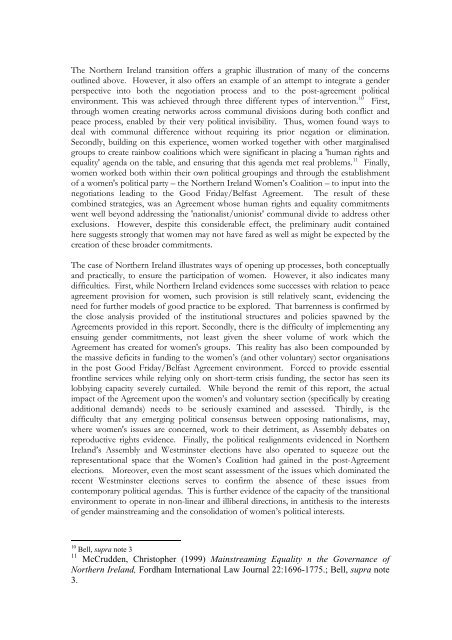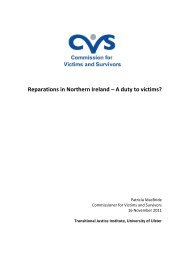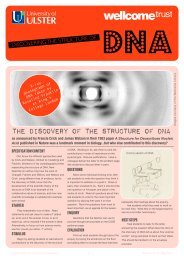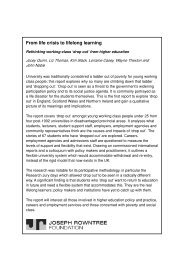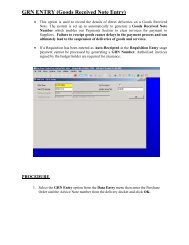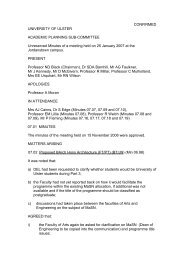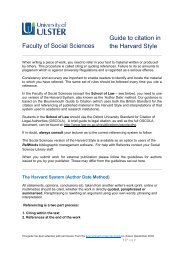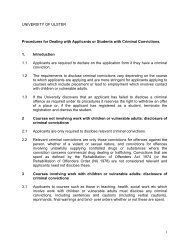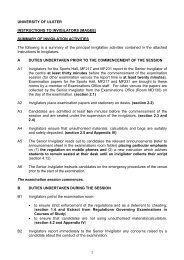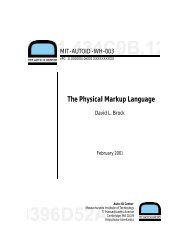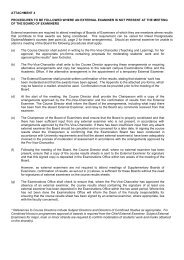Agreement Reached in the Multi-Party Negotiations - Transitional ...
Agreement Reached in the Multi-Party Negotiations - Transitional ...
Agreement Reached in the Multi-Party Negotiations - Transitional ...
You also want an ePaper? Increase the reach of your titles
YUMPU automatically turns print PDFs into web optimized ePapers that Google loves.
The Nor<strong>the</strong>rn Ireland transition offers a graphic illustration of many of <strong>the</strong> concerns<br />
outl<strong>in</strong>ed above. However, it also offers an example of an attempt to <strong>in</strong>tegrate a gender<br />
perspective <strong>in</strong>to both <strong>the</strong> negotiation process and to <strong>the</strong> post-agreement political<br />
environment. This was achieved through three different types of <strong>in</strong>tervention. 10 First,<br />
through women creat<strong>in</strong>g networks across communal divisions dur<strong>in</strong>g both conflict and<br />
peace process, enabled by <strong>the</strong>ir very political <strong>in</strong>visibility. Thus, women found ways to<br />
deal with communal difference without requir<strong>in</strong>g its prior negation or elim<strong>in</strong>ation.<br />
Secondly, build<strong>in</strong>g on this experience, women worked toge<strong>the</strong>r with o<strong>the</strong>r marg<strong>in</strong>alised<br />
groups to create ra<strong>in</strong>bow coalitions which were significant <strong>in</strong> plac<strong>in</strong>g a 'human rights and<br />
equality' agenda on <strong>the</strong> table, and ensur<strong>in</strong>g that this agenda met real problems. 11 F<strong>in</strong>ally,<br />
women worked both with<strong>in</strong> <strong>the</strong>ir own political group<strong>in</strong>gs and through <strong>the</strong> establishment<br />
of a women's political party – <strong>the</strong> Nor<strong>the</strong>rn Ireland Women’s Coalition – to <strong>in</strong>put <strong>in</strong>to <strong>the</strong><br />
negotiations lead<strong>in</strong>g to <strong>the</strong> Good Friday/Belfast <strong>Agreement</strong>. The result of <strong>the</strong>se<br />
comb<strong>in</strong>ed strategies, was an <strong>Agreement</strong> whose human rights and equality commitments<br />
went well beyond address<strong>in</strong>g <strong>the</strong> 'nationalist/unionist' communal divide to address o<strong>the</strong>r<br />
exclusions. However, despite this considerable effect, <strong>the</strong> prelim<strong>in</strong>ary audit conta<strong>in</strong>ed<br />
here suggests strongly that women may not have fared as well as might be expected by <strong>the</strong><br />
creation of <strong>the</strong>se broader commitments.<br />
The case of Nor<strong>the</strong>rn Ireland illustrates ways of open<strong>in</strong>g up processes, both conceptually<br />
and practically, to ensure <strong>the</strong> participation of women. However, it also <strong>in</strong>dicates many<br />
difficulties. First, while Nor<strong>the</strong>rn Ireland evidences some successes with relation to peace<br />
agreement provision for women, such provision is still relatively scant, evidenc<strong>in</strong>g <strong>the</strong><br />
need for fur<strong>the</strong>r models of good practice to be explored. That barrenness is confirmed by<br />
<strong>the</strong> close analysis provided of <strong>the</strong> <strong>in</strong>stitutional structures and policies spawned by <strong>the</strong><br />
<strong>Agreement</strong>s provided <strong>in</strong> this report. Secondly, <strong>the</strong>re is <strong>the</strong> difficulty of implement<strong>in</strong>g any<br />
ensu<strong>in</strong>g gender commitments, not least given <strong>the</strong> sheer volume of work which <strong>the</strong><br />
<strong>Agreement</strong> has created for women's groups. This reality has also been compounded by<br />
<strong>the</strong> massive deficits <strong>in</strong> fund<strong>in</strong>g to <strong>the</strong> women’s (and o<strong>the</strong>r voluntary) sector organisations<br />
<strong>in</strong> <strong>the</strong> post Good Friday/Belfast <strong>Agreement</strong> environment. Forced to provide essential<br />
frontl<strong>in</strong>e services while rely<strong>in</strong>g only on short-term crisis fund<strong>in</strong>g, <strong>the</strong> sector has seen its<br />
lobby<strong>in</strong>g capacity severely curtailed. While beyond <strong>the</strong> remit of this report, <strong>the</strong> actual<br />
impact of <strong>the</strong> <strong>Agreement</strong> upon <strong>the</strong> women’s and voluntary section (specifically by creat<strong>in</strong>g<br />
additional demands) needs to be seriously exam<strong>in</strong>ed and assessed. Thirdly, is <strong>the</strong><br />
difficulty that any emerg<strong>in</strong>g political consensus between oppos<strong>in</strong>g nationalisms, may,<br />
where women's issues are concerned, work to <strong>the</strong>ir detriment, as Assembly debates on<br />
reproductive rights evidence. F<strong>in</strong>ally, <strong>the</strong> political realignments evidenced <strong>in</strong> Nor<strong>the</strong>rn<br />
Ireland’s Assembly and Westm<strong>in</strong>ster elections have also operated to squeeze out <strong>the</strong><br />
representational space that <strong>the</strong> Women’s Coalition had ga<strong>in</strong>ed <strong>in</strong> <strong>the</strong> post-<strong>Agreement</strong><br />
elections. Moreover, even <strong>the</strong> most scant assessment of <strong>the</strong> issues which dom<strong>in</strong>ated <strong>the</strong><br />
recent Westm<strong>in</strong>ster elections serves to confirm <strong>the</strong> absence of <strong>the</strong>se issues from<br />
contemporary political agendas. This is fur<strong>the</strong>r evidence of <strong>the</strong> capacity of <strong>the</strong> transitional<br />
environment to operate <strong>in</strong> non-l<strong>in</strong>ear and illiberal directions, <strong>in</strong> anti<strong>the</strong>sis to <strong>the</strong> <strong>in</strong>terests<br />
of gender ma<strong>in</strong>stream<strong>in</strong>g and <strong>the</strong> consolidation of women’s political <strong>in</strong>terests.<br />
10 Bell, supra note 3<br />
11 McCrudden, Christopher (1999) Ma<strong>in</strong>stream<strong>in</strong>g Equality n <strong>the</strong> Governance of<br />
Nor<strong>the</strong>rn Ireland, Fordham International Law Journal 22:1696-1775.; Bell, supra note<br />
3.


